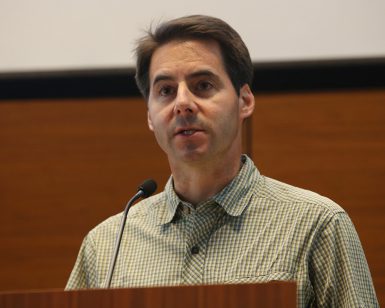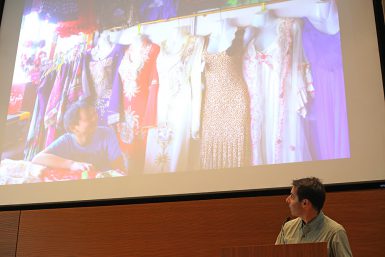Writer Hessler discusses Chinese entrepreneurs in Egypt

When journalists write about the outside world, stories tend to fall into two categories, says writer Peter Hessler. They’re either about people we should fear or people we should feel sorry for.
“I like to try to find something different, especially because of my experience starting in the Peace Corps,” Hessler told his audience Wednesday evening. “That wasn’t the way I learned to see China, and that’s not the way that I see Egypt, either.”
The New Yorker staff writer and National Geographic contributor spoke in a crowded auditorium at the Global and International Studies Building as the second guest of the school’s Speaker Series and as a speaker for the IU Arts and Humanities Council’s series, China Remixed.
Hessler drew on his years in China and recent experiences in Egypt for his talk, “Learning to Speak Lingerie: Chinese Entrepreneurs in Egypt and the Chinese Worldview,” which examined the cultural differences between Egyptians and the Chinese entrepreneurs who have set up shop in towns along the Nile. He wrote about this topic for The New Yorker.
An award-winning writer, Hessler first went to China with the Peace Corps in 1996 to teach English. He stayed for 11 years, joining The New Yorker in 2000 as the magazine’s China correspondent. He is author of three books about his experiences in China: River Town: Two Years on the Yangtze, which won the Kiriyama Prize; Oracle Bones, a finalist for the National Book Award, which juxtaposes contemporary events with ancient archaeology in China; and Country Driving, which explores economic development and China’s urbanization.
He returned to the U.S. and, after a period in Colorado, he moved to Cairo with his wife and then-18-month-old twin daughters. They arrived just before Arab Spring erupted and saw the rise and fall of then-President Mohamed Morsi. His research in China served as background for understanding Chinese entrepreneurs in Egypt.
“As a Westerner, it was fascinating to get away from our traditional way of seeing this place,” Hessler said.
Hessler was researching archaeology, so his work took him to smaller communities along the Nile. He began to hear about “the Chinese” in these smaller towns, and his interest was piqued. He began talking to Chinese business people in a variety of businesses.
He found that Chinese entrepreneurs went to Egypt largely because there were not many other businesses there. It is a culture of economic linkages, and the Chinese go where they see opportunity, he said.
The Chinese entrepreneurs he met in Egypt did not prepare for the culture change before they moved their families to the place of new financial prospects. Many were uneducated, did not bother to learn the language or even research areas of the country. One emigrated with one piece of luggage, which held pearls, neckties and lingerie – small items he could fit in the bag that he hoped had value to Egyptians.

Hessler said selling lingerie turned out to work best. Lingerie is connected to marriage and weddings in Egypt, so Chinese business people quickly learned what they needed to know about the local customs. Egyptian customers weren’t threatened by the Chinese business owners, because they didn’t feel the Chinese were determined to change those customs, Hessler said.
Using his knowledge of Chinese culture and language, Hessler was able to track down a symbiotic network of Chinese businesses that turned plastic waste into lingerie. One collected plastic trash, another processed it and another manufactured lingerie, which dozens sold.
When researching, it is important to leave room in your schedule to discover new things, Hessler said.
“When I do my research, I like to schedule some flexibility so that I can just see what turns up. I have often found that the most interesting things appear in this way,” he said.
His work also inspires bravery in those apprehensive about exploring new cultures. Senior international student advisor Dominic Portori, who introduced Hessler, said he gave copies of River Town to nearly everyone he came in contact with who was wary of going abroad.
“I looked to put something in students’ hands that could inspire them to think more broadly about living and working and studying abroad,” Portori said.
Among the audience were mother and daughter Paula and Esther King, who lived in rural China for four years. Paula King has given Hessler’s books to people to help them understand her and her daughter’s love of China.
“He understands, and he writes in a way that helps us explain to people,” Paula King said.
She works at IU’s Student Central, where she said she enjoys speaking with Chinese students. Her daughter is a sophomore studying anthropology.
“I think it was good to hear a third person confirm the economic and psychological circumstances that the Chinese people are in,” Esther King said.
The school’s Speaker Series continues April 21 with a talk by WBUR reporter Asma Khalid, BAJ’06, who covered the political campaigns for NPR last year. Her talk is at 2 p.m. in Presidents Hall in Franklin Hall.

